She was the queen of the animated screen and her cartoons were filled with great music, it wasn’t until the 1970’s that she made her debut on LP records.
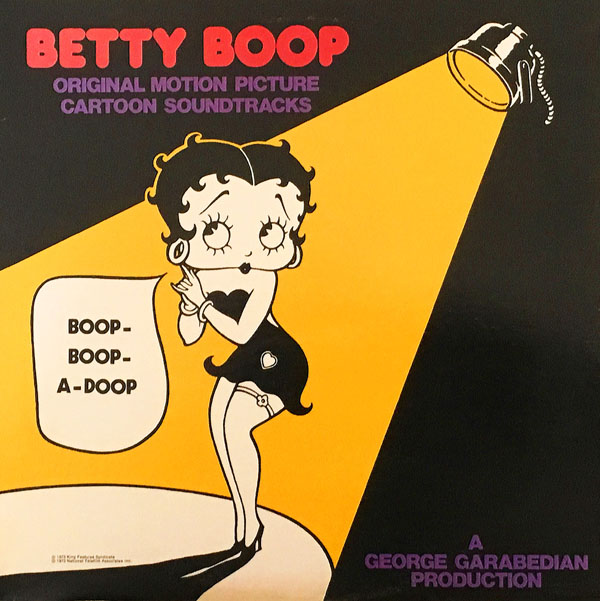
BETTY BOOP
Original Motion Picture Cartoon Soundtracks
Mark 56 Records #639 (12” 33 1/3 RPM / Mono)
Released in 1974. Album Producer: George Garabedian. Voices of Betty: Mae Questel, Margie Hines, Bonnie Poe, Little Ann Little, Kate Wright. Musical Direction: Sammy Timberg. Musical Supervision: Lou Fleischer. Running Time: 45 minutes.
Album Program:
• Betty Boop / Sweet Betty (Main Title)
• Dialogue (including “Don’t Take My Boop-Oop-Doop Away”) – Mae Questel, Max Fleischer and Reporter (Betty Boop’s Rise to Fame)
• Betty Boop’s Trial excerpt
• The Old Man of the Mountain / Hi-De-Hi – Cab Calloway
• I’m An Indian – Fanny Brice & Mae Questel (Betty Boop’s Rise to Fame)
• Hello Beautiful – Maurice Chevalier & Mae Questel (Betty Boop’s Rise to Fame)
• I’ll Be Glad When You’re Dead You Rascal You – Louis Armstrong
• I Know a Gal Named Betty Boop / How’m I Doin’? – Don Redman & His Orchestra
• Little Pal (Betty Boop’s Little Pal)
• Magic Mirror on the Wall (Snow-White)
• I Want to See My Step-Mama (Snow-White)
• Always in the Way (Snow-White)
• St. James Infirmary – Cab Calloway (Snow-White)
• Mother Goose Land (Sing You Sinners) (Mother Goose Land)
• I Like to Go With Mother Goose (Mother Goose Land)
• Sweeping’ the Clouds Away (Mother Goose Land)
• Little Jackie Horner (Mother Goose Land)
• Mother Goose Land Song (Mother Goose Land)
• Dum Dum Diddle Diddle (Mother Goose Land)
• Little Miss Muffet (Mother Goose Land)
• Humpty Dumpty (Mother Goose Land)
• The Woman in the Shoe (Mother Goose Land)
• Hi Diddle Diddle (Mother Goose Land)
• Three Blind Mice (Mother Goose Land)
• Old King Cole (Mother Goose Land)
• Sing A Song of Sixpence (Mother Goose Land)
• Ring Around a Rosy (Mother Goose Land)
• Mulberry Bush (Mother Goose Land)
• Mother Goose Land Song (Mother Goose Land)
• Bye Bye Blackbird (Mother Goose Land)
(NOTE: Many popular songs and public domain tunes were also interpolated)
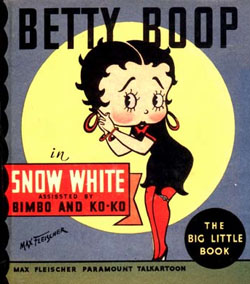 There is no shortage of 78 rpm records that were either heard in Betty Boop cartoons, came as a result of them, or inspired the character of Betty herself. Indeed, records were integral components of the initial Talkartoons that arrived with the dawn of sound films. According to The Fleischer Story by Leslie Cabarga, one of the many tasks of Fleischer brother Lou was to purchase records for use in Talkartoons. While the music, dialogue and sound effect for the shorts were being performed for the sound recording—in the Fleischer case, after the film was done—they would play the record as part of the session. (When the powers-that-be in the music business halted that practice, it led to live action appearances by the performers, bands and orchestras.)
There is no shortage of 78 rpm records that were either heard in Betty Boop cartoons, came as a result of them, or inspired the character of Betty herself. Indeed, records were integral components of the initial Talkartoons that arrived with the dawn of sound films. According to The Fleischer Story by Leslie Cabarga, one of the many tasks of Fleischer brother Lou was to purchase records for use in Talkartoons. While the music, dialogue and sound effect for the shorts were being performed for the sound recording—in the Fleischer case, after the film was done—they would play the record as part of the session. (When the powers-that-be in the music business halted that practice, it led to live action appearances by the performers, bands and orchestras.)
One singer whose records were not used for the cartoons were those of Helen Kane, who famously sued the Fleischers for appropriating her persona for Betty. The studio had already took the precaution of producing special recordings of the Kane songs by their own voice artists, such as Margie Hines.
The Kane suit—along with far more expert detail than will appear in this article, which focuses primarily on vinyl records—is chronicled in Ray Pointer’s fascinating tome, The Art and Inventions of Max Fleischer. Here is a particularly vivid moment of the real-life courtroom drama that leaps from the book’s pages:
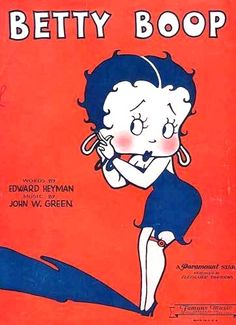 The attorneys spent the next several days dissecting each actress’ use of syllables, discerning the difference between “boop-oop-a-doop,” ‘boop-boop-a-doop,” “boop-oopy-doop,” “boo-boo-be-doo,” “poo-poopy-doo,” and even “poop-poopy-do-do.” This silly semantic argument became a source of uproarious laughter for the courtroom, with attorney arguing the differences between a boop-oop-doop” and a “poop-poopy-doop,” as well as the difference between boop-poop” and “poo-poop.” Members of the court, including the stenographer, were confused. After this exhaustive review of the “boop-oop-a-doopery” history, the stenographer threw up his hands in despair and the testimony of meaningless sounds was stricken from the record.
The attorneys spent the next several days dissecting each actress’ use of syllables, discerning the difference between “boop-oop-a-doop,” ‘boop-boop-a-doop,” “boop-oopy-doop,” “boo-boo-be-doo,” “poo-poopy-doo,” and even “poop-poopy-do-do.” This silly semantic argument became a source of uproarious laughter for the courtroom, with attorney arguing the differences between a boop-oop-doop” and a “poop-poopy-doop,” as well as the difference between boop-poop” and “poo-poop.” Members of the court, including the stenographer, were confused. After this exhaustive review of the “boop-oop-a-doopery” history, the stenographer threw up his hands in despair and the testimony of meaningless sounds was stricken from the record.
The suit was ruled in the Fleischer’s favor, but the use of famous people as the inspiration of cartoon characters has been a bone of contention throughout animation history, including Bert Lahr’s claim about Snagglepuss and Jackie Gleason’s suit for The Flintstones being like his Honeymooners sketches (which he abandoned at the risk of his image with families), both against Hanna-Barbera (though Bill Hanna seemed to be, at least anecdotally, fairly open about the freewheeling “exchange” of ideas).
Mark 56 Records was an Anaheim-based company that specialized primarily in classic radio shows with album covers sporting especially fine artwork (including that of Leslie Cabarga himself, who did the cover below). Occasionally there were soundtracks for Laurel and Hardy shorts and features, as well as The Little Rascals/Our Gang, but the Betty Boop albums were the only animation titles.
As the program list shows, the album is a treasure trove of great performances. Despite the absence of the fantastical Fleischer animation artistry, the pure audio experience allows the delightful music and dialogue to shine on its own.
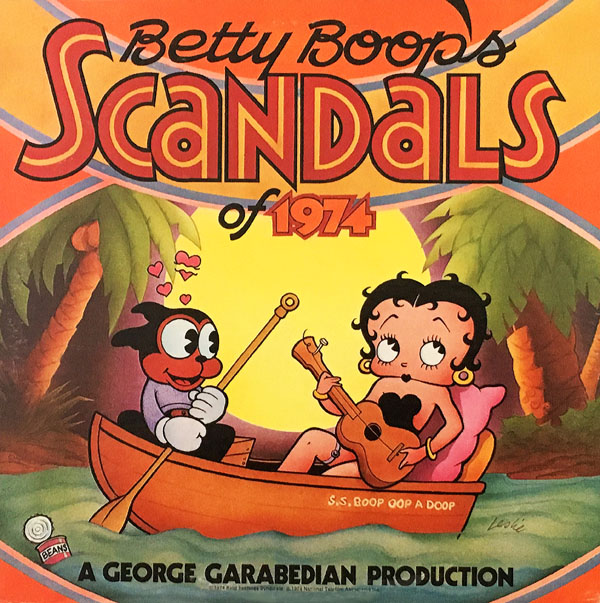
Stanley Tager Presents
A Max Fleischer Studios Retrospective
BETTY BOOP’S SCANDALS OF 1974
Original Motion Picture Soundtrack
Mark 56 Records #658 (12” 33 1/3 RPM / Mono)
Released in 1974. Album Producer: George Garabedian, from the Ivy Films Presentation. Voices of Betty: Mae Questel, Margie Hines, Bonnie Poe, Little Ann Little, Kate Wright, Cheryl Chase. Musical Direction: Sammy Timberg. Musical Supervision: Lou Fleischer. Cover Art; Leslie Cabarga. Running Time: 54 minutes.
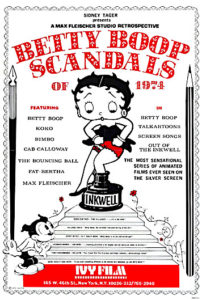
Album Program:
• They Always Pick On Me – Instrumental (Minnie the Moocher)
• St. James Infirmary – Instrumental (Minnie the Moocher)
• Minnie the Moocher – Instrumental (Minnie the Moocher)
• Opening Dialogue – Mae Questel, Max Fleischer and Dave Fleischer (Reporter) (Betty Boop’s Rise to Fame)
• That’s My Weakness (Stopping the Show)
• I’m An Indian – Fanny Brice & Mae Questel (Stopping the Show)
• Hello Beautiful – Maurice Chevalier & Mae Questel (Stopping the Show)
• Lotamuru – The Royal Samoans & Mae Questel (Betty Boop’s Bamboo Isle)
• The Old Man of the Mountain / Hi-De-Hi – Cab Calloway (Old Man of the Mountain)
• Concluding Dialogue Mae Questel, Max Fleischer and Dave Fleischer (Reporter) (Betty Boop’s Rise to Fame)
• Dialogue Excerpt from Stoopnocracy – Stoopnagle and Budd
• Please – Budd Hulick imitating Bing Crosby (Stoopnocracy)
• Minnie the Moocher – Harold Nicholas imitating Cab Calloway (Stoopnocracy)
• Bimbo’s Initiation (Complete Cartoon)
• Ha! Ha! Ha! (excerpt)
• Please (Gadget Band) (Boilesk)
• Frankie and Johnny (Instrumental) (Boilesk)
• Isn’t it Romantic? (Underscore with Dialogue) (Boilesk)
• I’m Playing with Fire (Boilesk)
• Listen to the Mockingbird (Underscore with Dialogue) (Boilesk)
• When the Red, Red, Robin Comes Bob, Bob, Bobbin’ Along (When the Red, Red, Robin Comes Bob, Bob, Bobbin’ Along)
• Swing You Sinners (Swing You Sinners)
Betty Boop’s Scandals of 1974 was a feature-length compilation of Fleischer shorts aimed at the student and art circuit. It was released one year before Bugs Bunny Superstar (and six years before the unfortunate Betty Boop for President), so it’s somewhat of a forerunner of such package films for the cartoon connoisseur in an age that was just waking up to animation research and appreciation.
Only a few of the elements of the soundtrack are the same as those on the other Mark 56 album, but this one boasts the complete Bimbo’s Initiation and several non-Betty clips as well. Better be sure and seek out both albums. (There were also a few stray Betty Boop soundtrack and “inspired” CD compilations in the ‘80s and ‘90s.)
“Barnacle Bill the Sailor”
– Mae Questel with Mitch Miller & The Sandpipers with the Jimmy Carroll Orchestra
Since the Betty Boop cartoons are fairly accessible and these records are pick-ups of the soundtracks, here is something rather unusual in their place—a Golden Record that harkens back, whether intentionally or not, to Betty’s second appearance in cartoons, as “Nancy Lee” in the Barnacle Bill, when she still sported dog ears. This Golden Record was recorded over 20 years later with Mae Questel herself re-enacting the song in a manner similar to that in the film—but it is placed in the context of Popeye, as she was now known primarily as the voice of Olive Oyl.
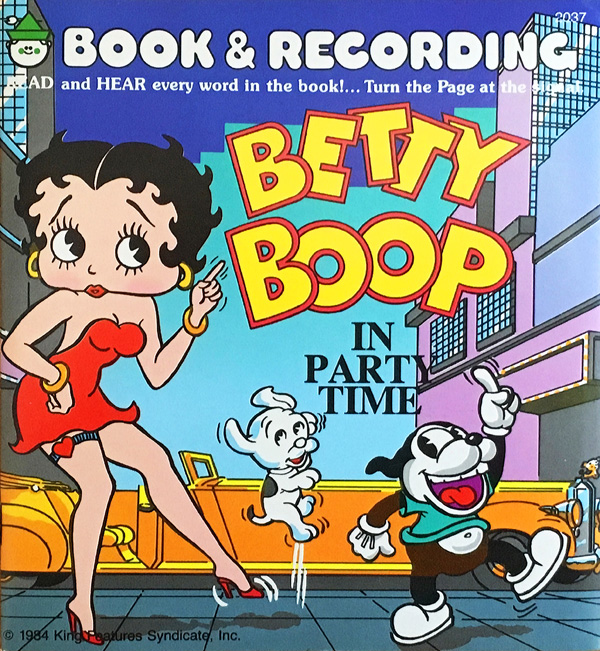
BETTY BOOP in “PARTY TIME”
Peter Pan Book & Recording #2037 (12” 33 1/3 RPM / Stereo)
Released in 1984. Executive Producer: Donald Kasen. Illustrations: Al Gordon. Voice of Bimbo: Lionel Wilson. Running Time: 11 minutes.
Betty Boop merchandise was popular in her day and continued to be sold for decades, even when her cartoons fell out of the mainstream. Restored to her her pre-code flapper look, Ms. Boop had become a pop culture icon. In 1984, Peter Pan Records surprised Betty Boop fans who happened be shopping in the children’s record department with a brand-new read-along book and record set starring Betty, Bimbo and Pudgy.
Even though Betty has had her tangles with the censors in the ‘30s, she was always marketed to kids, and this recording is no exception. Being a read-along, it is squarely aimed at tots. The story concerns an invitation to a party by Betty’s heretofore unknown friend “Carol,” giving Betty the impulse to have a makeover. As might be expected, the makeover is a disaster and when she arrives, no one recognizes her and she is turned away. After a fortuitous rainstorm, the makeup and hairdo wash away the makeover and everyone welcomes the Betty they know and love.
The recording was clearly made on a shoestring budget. By 1984, new Peter Pan titles (along with most other independently produced records) were starting to get scarce. The music is electronic and many of the voices are speeded up, including Betty’s. One bright spot is the surprise appearance of Peter Pan favorite Lionel Wilson—whom we just talked about in this Spin — as Bimbo.
“You Can’t Change Being You”
Two original songs are included, one sung by the makeover stylist that suggests “Les Poissons” from the not-yet-created Disney feature The Little Mermaid and a little ballad about the beauty that lies within, sung by the speeded-up voice actor performing the role of Betty.


 GREG EHRBAR is a freelance writer/producer for television, advertising, books, theme parks and stage. Greg has worked on content for such studios as Disney, Warner and Universal, with some of Hollywood’s biggest stars. His numerous books include Mouse Tracks: The Story of Walt Disney Records (with Tim Hollis). Visit
GREG EHRBAR is a freelance writer/producer for television, advertising, books, theme parks and stage. Greg has worked on content for such studios as Disney, Warner and Universal, with some of Hollywood’s biggest stars. His numerous books include Mouse Tracks: The Story of Walt Disney Records (with Tim Hollis). Visit 





















































Great post. I wish I had those 1974 Garabedian albums.
But did Jackie G. really sue HB over THE FLINTSTONES?
Reportedly he considered it, but he realized how negatively it might be perceived by his public.
Helen Kane later on appeared as Betty Boop. If I remember correctly, she appeared with Bela Lugosi as Dracula, and he threatened her with “You’ve booped your last boop.” It’s shown in a Fleischer documentary from some years back.
Jackie Gleason seems to have pared back on “The Honeymooners” during the run of “The Flintstones” but it could also have had to do with Audrey Meadows’ unavailability. There were very few new “Honeymooners” sketches from the early 60’s, with the brief exception of two sketches that featured Sue Ann Langdon as Alice. Once “The Flintstones” was off the air, and Jackie had transported his entire cast and crew to “the sun and fun capital of the world, Miami Beach” a new series of “Honeymooners” was launched, with Art Carney reprising his role of Ed Norton, and with Sheila MacRae as Alice and Jane Kean as Trixie. For at least four full seasons after “The Flintstones” had been dominating the airwaves on Friday nights, “The Honeymooners” ran successfully on “The Jackie Gleason Show on Saturday nights,”while “The Flintstones” found new life in Saturday morning reruns and later a new spin-off series, which proves you can’t keep a good Ralph Kramden or a good Fred Flintstone down. Or a good Betty Boop, for that matter.
Never thought of that — Gleason did revive The Honeymooners in The Flintstones’ last year, but whether he knew it was going to be canceled, I couldn’t say. It did time out well, though The Flintstones was ubiquitous on Saturday mornings and syndication.
Helen Kane used the Boop phrase and had the look, that’s why she sued. There’s a lot more detail in Pointer’s book. Even if the Fleischers hired her, the kind of salary her fame entitled was more than the cost of one cartoon.
Tina Louise also “Boop-Boop a-dooped” on that classic episode of Gilligan’s Island where Mary Ann thought she was Ginger, Ginger dressed like Mary Ann and Gilligan was hypnotized into thinking he was Mary Ann too. But unfortunately there was no soundtrack album.
The HOLLYWOOD ON PARADE entry you refer to with Bela Lugosi and Betty Boop as supposed wax figures coming to life is NOT Helen Kane. That was Bonnie Poe. This is another Urban Legend that has circulated for decades. When you consider that Helen Kane sued over Betty Boop and LOST it would not seem credible that she would appear as the very figure she tried to fight, claiming that she had “stolen her audience.”
I have the Garabedian LPs!
Betty gives me a (cartoon) woody.
@Greg
‘Tina Louise also “Boop-Boop a-dooped” on that classic episode of Gilligan’s Island where Mary Ann thought she was Ginger, Ginger dressed like Mary Ann and Gilligan was hypnotized into thinking he was Mary Ann too. But unfortunately there was no soundtrack album.’
Likewise, the great ep with The Mosquitoes (Bingo, Bango, Bongo & Irving).
Tina Louise was imitating Marilyn Monroe in SOME LIKE IT HOT.
Oh yes, Marilyn booped, then Tina re-booped.
There was another compilation feature of Betty Boop cartoons released in 1973 called ‘The Betty Boop Scandals’.
Did anyone here ever see either that or ‘The Betty Boop Scandals of 1974’ when they were released back in the 70s?
I definitely saw BETTY BOOP SCANDALS OF 1974 at the Little Art Theatre in Yellow Springs, Ohio. Very entertaining, as Betty Boop cartoons had not been seen in that area for many years. “Koko’s Earth Control” was shown silent, no soundtrack. The film was reviewed in a 1974 issue of CINEFANTASTIQUE magazine.
The French Betty Boop DVD box also comes with a cd featuring some of the songs from Betty’s cartoons
Did Mark 56 give royalties or did they steal the material?
Fleischer Studios NEVER hired Helen Kane for any of the cartoons, and didn’t have to since there were so many imitators, which they used. That’s why the women who imitated her testified during her Court Case in 1934, which she lost. Had Fleischer used any of Helen Kane’s own recordings, or if Paramount had furnished soundtracks from Helen Kane’s films, she would have had provable damages. But they used covers.
Apparently they were licensed through Ivy FIlms, who was licensed by NTA.
While BARNACLE BILL THE SAILOR was first done as a cartoon in 1930, with the second appearance of what was developing as “Betty Boop” the song is best remembered from the Popeye treatment in BEWARE OF BARNACLE BILL (1935). This record really is a reference to that cartoon, with Mae Questel reprising her role.
THE FLEISCHER STORY does not state that Lou Fleischer purchased 78s for use in the cartoons. Lou received MANY 78s for consideration. The only time that he purchased on, from what he told me was when the record Dave gave him of Eddie Peabody playing the banjo for the production of the cartoon, HOT DOG (1930) got broken while he was riding home on a crowded subway. He got off at the next stop and purchased a replacement.
Ah, thank you. BTW, they really should make a miniseries or something out of what happened to the Fleischers. It’s got all the ingredients.
Betty Boop. Creator
M. Pescara with his new aviation machine the helicopter, France.
Full titles read: “New Era in Flying – arrives as M. Pescara succeeds in rising vertically in his 15 cwt helicopter the machine of the future when perfected.”
M/S of Raúl Pateras Pescara de Castelluccio sitting in the very lightweight looking helicopter. The four rotors start spinning around at incredible speed and the flying machine lifts off the ground and hovers just above the ground for a few seconds before returning to earth. M/S of helicopter taking off again, this time the landing is a bit more bumpy! C/U of Pescara.
FILM ID:258.11
A VIDEO FROM BRITISH PATHÉ. EXPLORE OUR ONLINE CHANNEL, BRITISH PATHÉ TV. IT’S FULL OF GREAT DOCUMENTARIES, FASCINATING INTERVIEWS, AND CLASSIC MOVIES. FOR LICENSING ENQUIRIES VISIT. Definitions
The New Era Flying. Title
I. Sparber, Tom Johnson, John Gentilella, Anton Loeb, Winston Sharples, Carl Meyer And Jack Mercer. Cast
Language. Old English
Publication date. 1950-05-13
Starring. Mae Questel
Country. United States
Animation. David Tendlar
Running time. 2 minutes
Production company. Famous Studios Paramount Pictures
Music. Sammy Timberg
Directed. Dave Fleischer
Produced. Max Fleischer
Betty Boop. Creator
SV Pan, King George VI, Queen Elizabeth (later Queen Mother) and Royal party walking towards Dome of Discovery. SV King and Queen greet Clement Attlee and Winston Churchill. CU Foreign dignitaries. SV Queen Mary in wheel chair. SV King, Queen and Attlee. LV People walking through turnstiles with umbrellas. CU signpost ‘River Walk’ etc. SV Back view, man and woman walking through puddle. GV Pigeons being released in Battersea park. CU Drum major heading 1,000 pipers through Edinburgh, Scotland. SV pipers marching. VS Performers at National Eisteddfod in Wales. Definitions
The Festival Year. Title
I. Sparber, Larz Bourne, Anton Loeb, Winston Sharples, Mayron Waldman. WM.B.Pattengill. Cast
Language. Old English
Publication date. 1951-12-30
Starring. Mae Questel Frances Reynolds
Country. United States
Animation. David Tendlar
Running time. 5 minutes
Production company. Famous Studios Paramount Pictures
Music. Sammy Timberg
Directed. Dave Fleischer
Produced. Max Fleischer
BETTY BOOP The Essential Collection 1920s Short 1 vol 1 (2018)
BETTY BOOP The Essential Collection 1930s Short 36 vol 2 (2018)
BETTY BOOP The Essential Collection 1930s Short 60 vol 3 (2018)
BETTY BOOP The Essential Collection 1930s Short 30 vol 4 (2018)
BETTY BOOP The Essential Collection 1940s Short 25 vol 5 (2018)
BETTY BOOP The Essential Collection 1950s Short 3 vol 6 (2018)
Betty Boop. Creator
“Cc’è la luna n menzu ô mari” (Sicilian for ‘There’s the moon amid the sea’), mostly known in the English-speaking world as “C’è la luna mezzo mare”, “Luna mezz’o mare” and other similar titles, is a comic Sicilian song with worldwide popularity, traditionally styled as a brisk 6
8 tarantella. The song portrays a mother-daughter “coming of age” exchange consisting of various comic, and sometimes sexual, innuendos. It is frequently performed at Italian-American wedding receptions and other festive occasions. Hit versions have included “Oh! Ma-Ma! (The Butcher Boy)” by Rudy Vallée and “Lazy Mary (Luna Mezzo Mare)” by Lou Monte. Definitions
No Place Like Rome. Title
Irving Spector, Jack Henegan, I. Sparber Cast
Language. Old English
Publication date. 1953-07-31
Starring. Mae Questel Al Eugster, George Germanetti
Country. United States
Animation. David Tendlar
Running time. 7 minutes
Production company. Famous Studios Paramount Pictures
Music. Sammy Timberg
Directed. Dave Fleischer
Produced. Max Fleischer